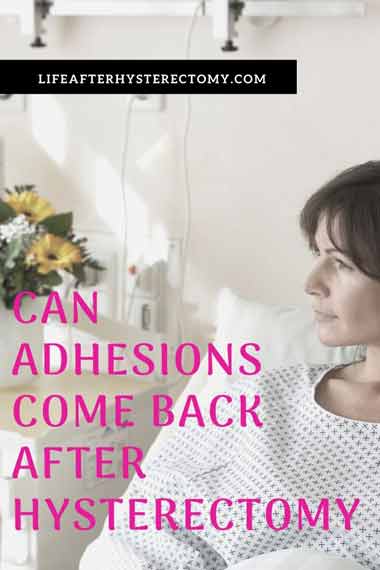What are Signs of Adhesions after Hysterectomy?
This blog is reader-supported. When you buy through a link on our site, we earn a commission at no extra cost to you. Read more
What do adhesions feel like after a hysterectomy? You may be curious to know what are the symptoms of adhesions after hysterectomy surgery and what to expect if this is the case.

There are lots of things that you may be concerned about after having a hysterectomy, but adhesions are one complication that you may not be aware of.
A point often overlooked is that adhesions are a common problem after any type of surgery.
And unfortunately, hysterectomies are no exception. Most people don’t even know if they have adhesions, but if they cause complications, symptoms will develop.
What Are Adhesions?
Adhesions are essentially scar tissues that can develop on your pelvic organs after abdominal surgery.
Under normal circumstances, the pelvic organs and the tissues around them are coated with a slippery surface that stops them from sticking together. When you have surgery, it can encourage your body to react as a way of trying to heal from the trauma and this can mean that scar tissue builds up. Because the normal surface has been disrupted, adhesions can encourage your pelvic organs to stick together.
Adhesions are generally less likely to occur after a laparoscopic hysterectomy, possibly because the incisions are smaller than an abdominal hysterectomy.
What else can cause adhesions?
- Endometriosis
- Abdominal and gynecological infections
- Conditions that cause chronic inflammation (Chron’s disease, Irritable Bowel Syndrome, ulcers)
- Radiation therapy for cancer
- Blunt force trauma to the abdomen
Symptoms of Adhesions after hysterectomy
How can you tell if you may have developed adhesions after hysterectomy? There won’t always be obvious symptoms unless adhesions start to cause problems in the body.
You might assume that symptoms will become obvious in the immediate aftermath of surgery but it can be months or even years before adhesions cause any issues in your body. Therefore, it is hard to know whether your symptoms are due to adhesions or is linked to other health problems.
Adhesions can be difficult to diagnose. The symptoms of adhesions after hysterectomy are unpredictable, and there are many overlapping symptoms with irritable bowel syndrome and endometriosis.
Symptoms of adhesions after gynecologic surgery can vary depending on which organs are affected. The bowel, bladder, vagina, and pelvic organs can all potentially be involved and cause any of the following symptoms.
- Deep pelvic or abdominal pain
- Lower back pain
- Pain during intercourse
- Nausea
- Cramps and rumbling bowel sounds
- Diarrhea
- Constipation
- Persistent or intermittent bloating
- Decreased appetite
- Painful bowel movement
- Bowel obstruction
- Pain when passing urine
How to Diagnose Adhesions after Hysterectomy?
If your doctor suspects that adhesions are a possible cause of your symptoms, he may decide that further tests are necessary. You may also need to see a doctor who specializes in gastrointestinal issues at this point. He may want to look inside your abdomen through a laparoscope to see what is happening and if adhesions are present.
In the case they suspect you have a bowel obstruction, they are likely to physically examine your abdomen for signs of tenderness and take your temperature and heart rate.
Signs of Bowel Adhesions

Adhesions can sometimes cause problems in your bowel, potentially resulting in a partial or complete obstruction in this area.
In the event of intestinal adhesions, symptoms can include:
- Pain in the abdomen that comes and goes often feels like a “cramp-like” sensation in your stomach
- Abdominal bloating and swelling
- Nausea and vomiting
- Constipation (and sometimes diarrhea)
If you can’t pass wind and are not having bowel movements at all, this could indicate a complete obstruction in the bowel. Seek medical advice as soon as possible if you’re concerned that this is happening to you, as it can sometimes be life-threatening.
If you develop a bowel obstruction as a result of adhesions, it could potentially recur again – often in the first four or five years after the initial bowel obstruction.
How to Treat Adhesions after Hysterectomy?
If you have adhesions, but they aren’t causing any problems, it’s likely that your doctor will go down the non-surgical route in treating them. In some cases, this may mean doing nothing at all other than managing pain.
Partial bowel obstructions can sometimes be treated in the hospital without the need for surgery. You may be advised to drink plenty of fluids and eat a low-fiber diet for a few days so that your bowel can cope more easily. If this doesn’t resolve the situation, then surgery is the next step to remove the adhesions and treat the obstruction in your bowel.
Treatment of adhesions through surgery they call adhesiolysis. They will try to remove as much scar tissue as possible and separate connected organs. This will not only help to restore the normal function of the organs but also relieve pain. It is generally a last resort, given that all surgery can lead to more adhesions.
Managing Pain from Adhesions after Hysterectomy
If your adhesions aren’t causing any issues in your body, you may be advised to manage the pain rather than think about surgery (especially given that surgery increases your risk of developing more adhesions on top of the ones you already have). Non-prescription painkillers such as ibuprofen and paracetamol may be recommended to manage pain caused by adhesions.
How to Avoid Adhesions after Hysterectomy?
Surgeons can take measures to reduce your risk of developing adhesions, and these can include using a saline solution in your abdomen before the incision is closed up, using sutures that are less likely to be linked to adhesions, and putting mesh over your pelvic organs to make them less likely to stick together.
This doesn’t guarantee that adhesions won’t become a problem in the future, though, as any type of surgery makes them more likely to occur.
There are also some ways you can reduce your risk factor for developing adhesions while recovering from your hysterectomy. One of the main ones involves taking it easy and not trying to do too much too soon.
Moving around is fine, but lifting, stretching, jogging, and swimming can all affect your healing and open up small tears in the tissue around where your hysterectomy wound was closed. Being cautious in your post-hysterectomy recovery can be frustrating, but it can help both the wound itself and the tissues around it.
Will Adhesions Come Back Again?
If you have had surgery to remove adhesions, it can create a vicious cycle whereby you’re more likely to develop more adhesions in the future because of the surgery.
Adhesions can be a fairly common occurrence after surgery in general, including hysterectomy surgery. You can reduce the risks by making sure that you don’t overdo things while you’re still recovering from your hysterectomy.
Related posts
- How to prevent a vaginal cuff tear after hysterectomy
- Tips to Prevent Blood Clots after Hysterectomy That Can Save your Life
- Stressed About Hysterectomy Risks? What Every Woman Must Know
- Hysterectomy Pain After Surgery- Tips To Identify Its Source
- 5 Main causes of bowel problems after hysterectomy


Tell them it’s your body and I know what I feel I’m not a text book thankyou
I just had surgery to remove several adhesions. I’ve had so many issues and my gi didn’t know what was wrong with me. This was the last resort and hopefully I’ll have some relief. I understand adhesions can grow back but if I can get some relief even temporary I’ll take it.
I had a complete radical hysterectomy 28 years ago. I am being treated for several back issues, one being disc’s needing fused and had one done already, ankling spondylitis,etc. I have had IBS since I can remember..I have fibro and the list goes on. My back pain is middle of my back on down into buttocks and around to the hips in front then the abdoment -feels like someone is stabbing me with a knife. I hurt SO badly when I have BM’s, not every time, but alot of the time. I have asked 3 different doctors if they thot my pain in abdomen might be from scar tissue from hysterectomy and they all have looked at me like I was invisible, the looks on their face like, “what the heck is she talking about?!” and give me no credit and a vague answer if that. How can I get a doctor to take me seriously without begging? I know they don’t like it when patients look things up online and self diagnose, but I feel like I just have so much inflammation in my gut/back area all tied together it’s hard to know for sure without cutting in to me, but the more I press asking doc’s to do tests that would give answers, the less inclined they are to take me seriously. ANy suggestions on how to approach doc’s in this matter? Thanks!!!!!